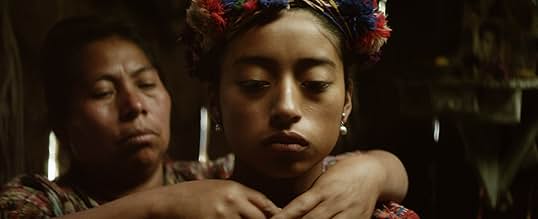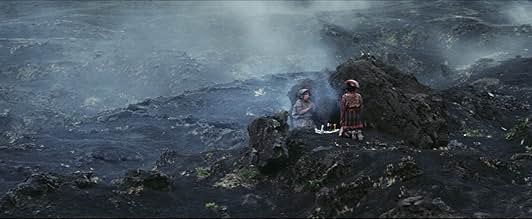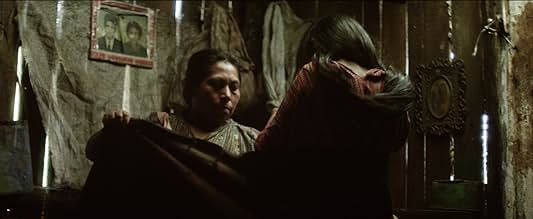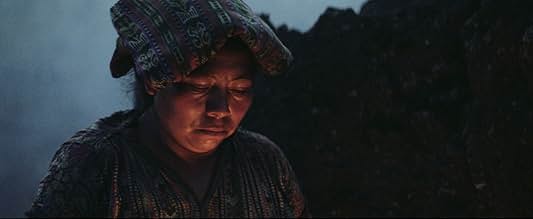IMDb RATING
7.1/10
3.4K
YOUR RATING
On the slopes of an active volcano in Guatemala, a marriage is arranged for seventeen-year-old María by her Kaqchikel parents.On the slopes of an active volcano in Guatemala, a marriage is arranged for seventeen-year-old María by her Kaqchikel parents.On the slopes of an active volcano in Guatemala, a marriage is arranged for seventeen-year-old María by her Kaqchikel parents.
- Awards
- 23 wins & 24 nominations total
- Director
- Writer
- All cast & crew
- Production, box office & more at IMDbPro
Featured reviews
A beautiful film that very much transports the viewer to the struggles of a girl coming of age and working on a coffee plantation with her parents at the foot of a volcano in Guatemala. The cinematography is gorgeous, the story is heartfelt, and the performances all feel truly authentic. I thank Letterboxd user Muffintree for his suggestion to watch this film, and would recommend it to others as well.
It's clear early on that we're being plunged into a world without the luxury of pretense, where eating pork doesn't mean going in to the air-conditioned market and buying a neatly packaged cut of bloodless pink meat, and living with one's parents doesn't mean being able to pretend they don't have sex, since everyone sleeps in the same room. In this world coffee beans are tediously picked by hand, and workers (who speak indigenous Kaqchikel) are exploited by owners (who also speak the language of the ruling class, Spanish). The owners know that the laborers have few opportunities, and also run a bar where the workers might run up an alcohol tab that erases the earnings they receive from a careful weighing of the beans they've picked. All of this is so that affluent people in far-off lands like America can sip a gourmet brew, made to order by a person with a college degree in English Lit and getting a paltry minimum wage, but I digress.
The daughter (the soulful María Mercedes Coroy) has been betrothed to her father's boss, the foreman of the plantation, a situation that might improve her family's situation. Unfortunately she's more attracted to a field worker who dreams of running away to America to escape the poverty of his life in Guatemala, and drinks to excess maybe to escape it in another way. The way the parents (María Telón and Manuel Manuel Antún) support the daughter is amazing, despite the decisions she makes which have disastrous consequences. The mother-daughter bond is truly special and seems eternal, and I imagined it representing a link which must stretch back generations upon generations into the past. It was also pretty cool to see the father not erupt into anger, instead calmly accepting what happened as if a weather conditions had caused a bad crop one year. Nothing is romanticized here, but the film shows the family bond and perseverance in the face of a hard life, starting with accepting each other.
It's clear early on that we're being plunged into a world without the luxury of pretense, where eating pork doesn't mean going in to the air-conditioned market and buying a neatly packaged cut of bloodless pink meat, and living with one's parents doesn't mean being able to pretend they don't have sex, since everyone sleeps in the same room. In this world coffee beans are tediously picked by hand, and workers (who speak indigenous Kaqchikel) are exploited by owners (who also speak the language of the ruling class, Spanish). The owners know that the laborers have few opportunities, and also run a bar where the workers might run up an alcohol tab that erases the earnings they receive from a careful weighing of the beans they've picked. All of this is so that affluent people in far-off lands like America can sip a gourmet brew, made to order by a person with a college degree in English Lit and getting a paltry minimum wage, but I digress.
The daughter (the soulful María Mercedes Coroy) has been betrothed to her father's boss, the foreman of the plantation, a situation that might improve her family's situation. Unfortunately she's more attracted to a field worker who dreams of running away to America to escape the poverty of his life in Guatemala, and drinks to excess maybe to escape it in another way. The way the parents (María Telón and Manuel Manuel Antún) support the daughter is amazing, despite the decisions she makes which have disastrous consequences. The mother-daughter bond is truly special and seems eternal, and I imagined it representing a link which must stretch back generations upon generations into the past. It was also pretty cool to see the father not erupt into anger, instead calmly accepting what happened as if a weather conditions had caused a bad crop one year. Nothing is romanticized here, but the film shows the family bond and perseverance in the face of a hard life, starting with accepting each other.
With beautiful cinematography and art directon, and a well directed first-time casting, the film tells a story held in a traditional Mayan Kaqchikel community who worships nearby volcano, avoids the snakes that live there, and is exploited by greedy employers in a coffee plantation. María has been promised to marry the foreman of the plantation. However, not only she does not want it, but also is sexually excited in her virgin teen age and is attracted to Pepe. The latter is a drunkard who dreams about fleeing to the United States, where he expects everything is better than in Guatemala countryside. Well, then there is a well built drama, which explores where Kaqchikel rural and indigenous culture. Harsh reality is interwined with magic, the sadness of unsafe uncertainty faces the happiness of life.
Ixcanul is a practically flawless work of naturalistic cinema. Much has been said about the cutural specifics of the film, but not enough about Ixcanul as an argument for the vitality of naturalism, in an era that has been blinkered with frivolous spectacle. The movie treats its audience as adults, never telling them what to think or feel. It's beautifully lit and composed, subtle, thorny and complex. If you can find nothing engaging here, it's hardly the fault of the film.
Ixtanul is a very unique film in that it causes the viewers to question. This film essentially about a young girl named Maria, who prepares for her arranged wedding (set by her parents) as she overcomes unusual obstacles along the way. Although this film is slow and not very action-packed, it taught me a lot about Mayan culture and tradition in Guatemala. This film was unlike any film I have ever seen because of its mystery and lack of sound. There was almost no music in this film, which I thought was really interesting because it added uniqueness to the film. Also, the camera angles and shots were very different than most other films. Overall, this film taught me more about Guatemalan society than I have ever known.
The movie "Ixcanul" tells the story of a young Indigenous girl in Guatemala who confronts a conflict between tradition and change after an unexpected event jeopardizes her future.
Director and writer Jayro Bustamante depicts the traditions of an Indigenous community that relies on coffee harvesting near an active volcano, which they honor as a god.
The movie explores the familiar theme of the clash between the traditions of one generation and the modern values of the younger generation.
The movie's charm comes from the simplicity of this Indigenous community's way of life, where there is no drama, stress, yelling, or parental backlash in response to their daughter's struggles or sudden homelessness. The movie also questions whether a simple, traditional life with enough resources is preferable to chasing "greener pastures" in the North.
In summary, it's a captivating and sincere film that avoids becoming a cheesy tearjerker.
Director and writer Jayro Bustamante depicts the traditions of an Indigenous community that relies on coffee harvesting near an active volcano, which they honor as a god.
The movie explores the familiar theme of the clash between the traditions of one generation and the modern values of the younger generation.
The movie's charm comes from the simplicity of this Indigenous community's way of life, where there is no drama, stress, yelling, or parental backlash in response to their daughter's struggles or sudden homelessness. The movie also questions whether a simple, traditional life with enough resources is preferable to chasing "greener pastures" in the North.
In summary, it's a captivating and sincere film that avoids becoming a cheesy tearjerker.
Did you know
- TriviaThe film was selected as the Guatemalan entry for the Best Foreign Language Film at the 88th Academy Awards but was not nominated.
- SoundtracksMala Mujer
[from the albumLos Mejores Éxitos Bailables Vol. 2. Música de Guatemala"]
Performed by Fidel Funes Y Su Marimba Orquesta
Written by Fidel Funes
Published by Edifosa
Courtesy of Difosa
- How long is Ixcanul?Powered by Alexa
Details
- Release date
- Countries of origin
- Official sites
- Languages
- Also known as
- 火山少女的愛愁
- Filming locations
- Production companies
- See more company credits at IMDbPro
Box office
- Gross US & Canada
- $295,157
- Gross worldwide
- $594,836
- Runtime
- 1h 33m(93 min)
- Color
- Aspect ratio
- 2.35 : 1
Contribute to this page
Suggest an edit or add missing content






















